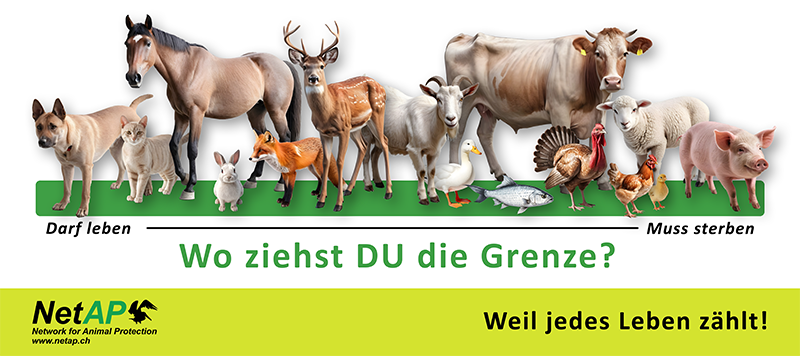Spenden
- Activities
- About NetAP
- Your help
- Education
- Media

Definition of veganism (Vegan Society of England): Veganism is a way of life that seeks – as far as practicable – to avoid all forms of exploitation and cruelty to animals capable of suffering for food, clothing and other purposes; and subsequently promotes the development and use of animal-free alternatives for the benefit of people, animals and the environment. In terms of food, this means avoiding all products that are wholly or partly derived from animals.
Veganism, as a lifestyle and diet, is becoming increasingly important worldwide and is being adopted by a growing number of people for a variety of reasons. The effects on the climate, animal welfare and individual health are often at the centre of this decision.
In addition to ethical reasons, the decision to go vegan is often associated with the desire to protect the environment. Studies by the University of Oxford show that the ecological footprint of a vegan diet is significantly smaller than that of a meat-based diet. The production of plant-based foods generally requires fewer resources such as water and land and produces lower greenhouse gas emissions.
The animal industry contributes significantly to global warming through the massive waste of food, as the land and water consumption required for meat production is many times higher than for the direct utilisation of plant-based foods. For example, over 80% of the world’s soya cultivation ends up as animal feed in factory farming. Europe is a major consumer of feed soya, which is mainly grown in South America and leads to deforestation and species extinction.
Research by Joseph Poore at the University of Oxford found that avoiding animal products is one of the most effective ways to reduce an individual’s carbon footprint. This emphasises the importance of the vegan lifestyle in the fight against climate change.
The moral dimension of veganism manifests itself in the concern for animal welfare. Factory farming and the associated practices must be regarded as ethically questionable. Veganism as a lifestyle sets an example against the exploitation of animals and promotes a more sustainable and respectful relationship with other living beings.
There are almost always stories of suffering behind the billions of animals that are killed for food every year, because factory farming is the result of this enormous demand for meat and other animal products. The motto is to produce as cheaply and as much as possible – and always at the expense of the animals.
An animal that is kept as a farm animal has only one purpose: to generate as much profit as possible in as short a time as possible. One of the consequences of this is that these animals only reach an average of around 5% of their natural life expectancy and for the most part suffer from inappropriate husbandry. In Switzerland alone, millions of animals are slaughtered every year to cover the population’s enormous consumption of meat and animal products.
Avoiding animal products is an active contribution to reducing animal suffering and promoting a world in which animals are treated with respect and compassion.
You can find detailed links between nutrition and animal welfare on the websites of Swissveg, the vegane Gesellschaft Schweiz, the Vegan Society or ProVeg Deutschland.
The effects of a vegan diet on human health have been intensively researched. Harvard Medical School emphasises that a balanced vegan diet with sufficient intake of nutrients such as vitamin B12, iron and omega-3 fatty acids has positive effects on health. The studies suggest that a plant-based diet can reduce the risk of cardiovascular disease, type 2 diabetes and certain types of cancer. By avoiding animal products, people can also more easily maintain a healthy body weight and promote their overall health.
To summarise, veganism not only emphasises the environmental aspect, but also the ethical commitment to animal welfare and the promotion of individual health. By making a conscious decision to abstain from animal products, people are setting an example for a sustainable and compassionate way of life.
